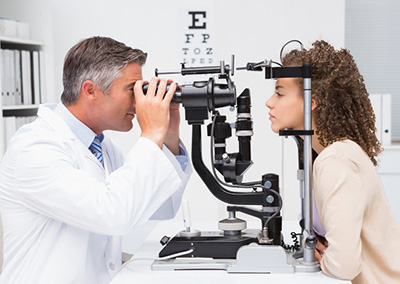Your eyes are an important part of your health. You can do many things to keep them healthy and make sure you’re seeing your best. Follow these simple guidelines for maintaining healthy eyes well into your golden years.
Have a comprehensive dilated eye exam. You might think your vision is fine or that your eyes are healthy, but visiting your eye care professional for a comprehensive dilated eye exam is the only way to really be sure. When it comes to common vision problems, some people don’t realize they could see better with glasses or contact lenses. In addition, many common eye diseases, such as glaucoma, diabetic eye disease, and age-related macular degeneration, often have no warning signs. A dilated eye exam is the only way to detect these diseases in their early stages.
During a comprehensive dilated eye exam, your eye care professional places drops in your eyes to dilate, or widen, the pupil to allow more light to enter the eye—the same way an open door lets more light into a dark room. This process enables your eye care professional to get a good look at the back of the eyes and examine them for any signs of damage or disease. Your eye care professional is the only one who can determine if your eyes are healthy and if you’re seeing your best.
Maintain your blood sugar levels. 90% of blindness caused by diabetes is preventable. Ask your health care team to help you set and reach goals to manage your blood sugar, blood pressure, and cholesterol—also known as the ABCs of diabetes.
A1c: The goal set for many people is less than 7% for this blood test, but your doctor might set different goals for you.
Blood pressure: High blood pressure causes heart disease. The goal is less than 140/90 mmHg for most people, but your doctor might set different goals for you.
Cholesterol: LDL or “bad” cholesterol builds up and clogs your blood vessels. HDL or “good” cholesterol helps remove the “bad” cholesterol from your blood vessels. Ask what your cholesterol numbers should be.
Know your family’s eye health history. Talk to your family members about their eye health history. It’s important to know if anyone has been diagnosed with an eye disease or condition, since many are hereditary. This information will help to determine if you’re at higher risk for developing an eye disease or condition.
Eat right to protect your sight. You’ve heard that carrots are good for your eyes. But eating a diet rich in fruits and vegetables—particularly dark leafy greens, such as spinach, kale, or collard greens—is important for keeping your eyes healthy, too.i Research has also shown there are eye health benefits from eating fish high in omega-3 fatty acids, such as salmon, tuna, and halibut.
Maintain a healthy weight. Being overweight or obese increases your risk of developing diabetes and other systemic conditions, which can lead to vision loss, such as diabetic eye disease or glaucoma. If you’re having trouble maintaining a healthy weight, talk to your doctor.
Wear protective eyewear. Wear protective eyewear when playing sports or doing activities around the home. Protective eyewear includes safety glasses and goggles, safety shields, and eye guards specially designed to provide the correct protection for the activity in which you’re engaged. Most protective eyewear lenses are made of polycarbonate, which is 10 times stronger than other plastics. Many eye care providers sell protective eyewear, as do some sporting goods stores.
Quit smoking or never start. Smoking is as bad for your eyes as it is for the rest of your body. Research has linked smoking to an increased risk of developing age-related macular degeneration, cataract, and optic nerve damage, all of which can lead to blindness.ii, iii
Be cool and wear your shades. Sunglasses are a great fashion accessory, but their most important job is to protect your eyes from the sun’s ultraviolet rays. When purchasing sunglasses, look for ones that block out 99 to 100 percent of both UV-A and UV-B radiation.
Give your eyes a rest. If you spend a lot of time at the computer or focusing on any one thing, you sometimes forget to blink and your eyes can get fatigued. Try the 20-20-20 rule: Every 20 minutes, look away about 20 feet in front of you for 20 seconds. This short exercise can help reduce eyestrain.
Clean your hands and your contact lenses—properly. To avoid the risk of infection, always wash your hands thoroughly before putting in or taking out your contact lenses. Make sure to disinfect contact lenses as instructed and replace them as appropriate. Learn more about keeping your eyes healthy while wearing contact lenses and listen to a podcast on keeping your eyes safe.
Practice workplace eye safety. Employers are required to provide a safe work environment. When protective eyewear is required as a part of your job, make a habit of wearing the appropriate type at all times, and encourage your coworkers to do the same.





































